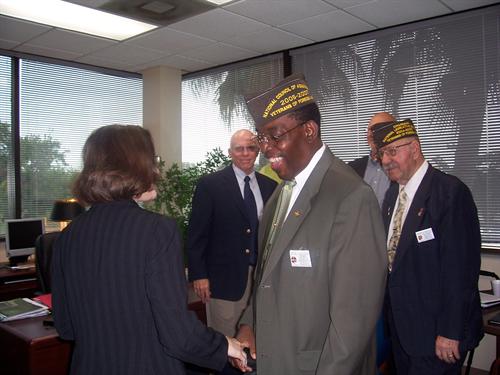Article
Questions mount for VABy WILLIAM R. LEVESQUE, St. Petersburg Times
Washington,
November 2, 2007
|
Agustina Guerrero
((813)871-2817)
U.S. Rep. Kathy Castor called the rates at which Tampa Bay veterans hospitals turn away sick patients "unbelievable" Thursday, and urged the man slated to take over the Department of Veterans Affairs to address the problem.
With patients being turned away, legislators wonder if it has enough resources. U.S. Rep. Kathy Castor called the rates at which Tampa Bay veterans hospitals turn away sick patients "unbelievable" Thursday, and urged the man slated to take over the Department of Veterans Affairs to address the problem. The St. Petersburg Times reported Sunday that VA hospitals in Tampa and St. Petersburg had gone on "divert" status, refusing to admit sick veterans for thousands of hours in recent years, leading paramedics to frequently take patients to other hospitals. In a letter to Dr. James Peake, nominated Tuesday by President Bush to become the new VA secretary, Castor referred to the story and wondered if the VA had adequate resources. "I am sure you would agree that ... more can be done to ensure that our veterans are not turned away by VA hospitals across the country," Castor said. "Our veterans who have sacrificed so much for our country need a reliable veterans' health care system. I urge you to act immediately to help solve the crisis." The Tampa Democrat's letter comes two weeks after U.S. Rep. C.W. "Bill" Young R-Indian Shores asked VA officials about diversion rates in the bay area. Young did so after an inquiry to his office by the Times. Young said in an interview Thursday he was satisfied that the VA is making "diligent efforts" to work on the problem. Applauding Castor's letter and referring to his own inquiries, Young said, "It tells the VA that Congress is watching." Peake, who is yet to be confirmed by the Senate, could not be reached late Thursday, and VA officials did not return calls to comment. VA officials in Washington have been reluctant to talk about diversion rates at agency hospitals around the country. The VA has failed to make any official available for an interview to talk about how often patients are diverted at VA hospitals nationally. In an interview, Castor said she suspects the problem of patient diversion within the VA goes far beyond the bay area. "It's not what we want for our veterans," she said. The Times reported Sunday that the James A. Haley VA Medical Center in Tampa had diverted critical patients carried by paramedics 27 percent of the time since Jan. 1, 2006, or the equivalent of about 170 days. Haley, the busiest VA hospital in the country, diverted all patients regardless of condition 16 percent of the time. The Bay Pines VA Medical Center in St. Petersburg has diverted patients more frequently than any other hospital in Pinellas County since 2000. Bay Pines patients were diverted about 13 percent of the time (48 days) last year, Pinellas paramedic records show. So far this year, the numbers at Bay Pines are much improved - roughly 7 percent. Bay Pines is the nation's fourth busiest VA hospital. As recently as 2003 and 2004, Bay Pines was diverting patients at rates similar to Haley. In 2003, for example, Bay Pines diverted paramedics 2,464 hours (about 102 days) - 28 percent of the time. "Those statistics are unbelievable," Castor said in an interview. In her letter, Castor said she thought a large part of the VA's capacity problem was related to a shortage of medical professionals such as physician residents. Young, however, said local VA officials had not highlighted to him any particular need for increased resources. "What we need from the VA is for them to tell us what their needs are," Young said. "Do you need more hospitals, more clinics, more personnel? We'll provide the money." While patient diversion is a common occurrence among urban hospitals even outside the VA, some wonder if it is especially acute in the agency, which has faced huge increases in patients during the last decade. "Although the capacity of VA hospitals is a national issue, veterans are impacted disproportionately in Florida because we are home to the second highest number of veterans in the nation," Castor told Peake. Times staff writer William R. Levesque can be reached at (813) 226-3436 or levesque@sptimes.com. |


